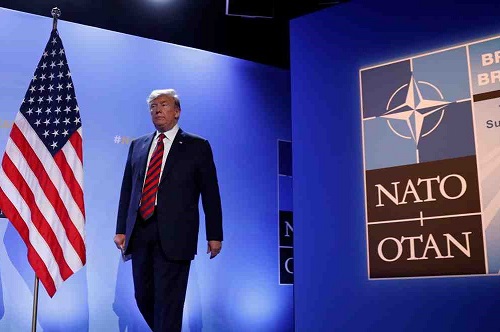Reuters photo
By
Tom Arms
Can he do it? The latest NATO summit ended with the alliance still intact, but Donald Trump has opened the door to an American exit with the chilling words: “It is presently unnecessary” to withdraw the United States from the North Atlantic Treaty Organisation.
Which means that it is still on the table.
Trump is angry that his alliance partners are slow in reaching the defence spending target of two percent of GDP by 2025. In fact he wants them to double the target to four percent. After all, America is spending 4.8 percent according to Trump (3.5 percent according to government accountants).
If they don’t? Well, that’s when he might start heading for the door he has just left ajar. Which brings us back to the question: Can he do it? As well as the questions of the impact on Europe, America and the wider world.
In theory it would seem that Trump would need the support of Congress to withdraw from the Western Alliance. But political practice points in the opposite direction.
Under the terms of the American Constitution all treaties and alliances need the approval of two-thirds of the members of the Senate. Once ratified they become part of “the supreme law of the land”. Exactly what this means, however, is open to interpretation. Founding father Thomas Jefferson interpreted it as meaning that revoking a treaty would also require approval from two-thirds of the Senate.
But more recent practice indicates otherwise. In 2002 George W. Bush decided to unilaterally withdraw from the US-Russian Anti-Ballistic Missile Treaty. The Leader of the Senate said nothing. Several democratic senators decided to sue in the courts to force a vote. It was rejected by the Washington DC federal judge partly because the Senate had already failed to adequately assert its powers and because the judge ruled: “Issues concerning treaties are largely political questions best left to the political branches of government, not the courts, for resolution.”
This treaty business cuts both ways. There are several treaties effectively in force without Senate approval. In each case, the White House enforced the treaty through executive decree because it feared rejection by the Senate. These include Salt II, the Law of the Sea Convention, Convention to Eliminate all forms of Discrimination Against Women, The Convention on the Rights of Persons with Disabilities and many others.
However, NATO is a—if not THE—cornerstone of American foreign policy. It is especially popular with Republican congressmen. So Donald Trump may find that the Senate rediscovers the interpretation of Thomas Jefferson along with its teeth if he decides to withdraw from NATO.
But as commander-in-chief he could effectively withdraw without actually withdrawing. He could refuse to supply weapons or spare parts to NATO allies. He could refuse to participate in NATO exercises and withdraw American forces from Europe. He could do all of the above without actually withdrawing from NATO.
But if he did so he would do irreparable harm not only to the defence of Europe but also to America’s position as a world power. The United States has 290 bases across Europe. The Europeans provide the land and, in most cases, a big chunk of the operational costs. The deal is simple: In exchange for allowing the US to operate on their sovereign soil the United States offers European protection.
The use of European sovereign soil also allows the United States to project its political and military power much further and faster than if it operated from bases thousands of miles away on the American eastern seaboard. The American forces not only operate in Europe, their bases are also staging posts for operations in Africa, the Middle East and Central Asia.
President Trump tends to view diplomatic relations in transactional dollars and cents terms. This is partly because of his business background and partly because that is an easy to understand formula for his supporters. But the world is much more complicated than that.
Tom Arms
I am a journalist, entrepreneur and historian with extensive experience in print, web and broadcast journalism. I started as a diplomatic correspondent, wrote several books (The Falklands Crisis, World Elections On File and the Encyclopedia of the Cold War), and then in 1987 started my own business (Future Events News Service, www.fensinformation.com) which over 25 years established itself as the world and UK media’s diary. Our strapline was: “We set the world’s news agenda.” I sold FENS in December 2012 but retained the exclusive broadcast rights to all of FENS data. To exploit these rights I set up LookAhead TV which produces unique programmes which “Broadcasts Tomorrow Today” so that viewers can “Plan to Participate.” LookAhead has appeared regularly on Vox Africa, Radio Tatras International, The Conversation and Voice of Africa Radio.
In addition to being a syndicated broadcaster and columnist on global affairs, Tom is also available for speaking engagements and can be contacted on Twitter, Linkedin and email: [email protected].



No Comments Yet!
You can be first to comment this post!